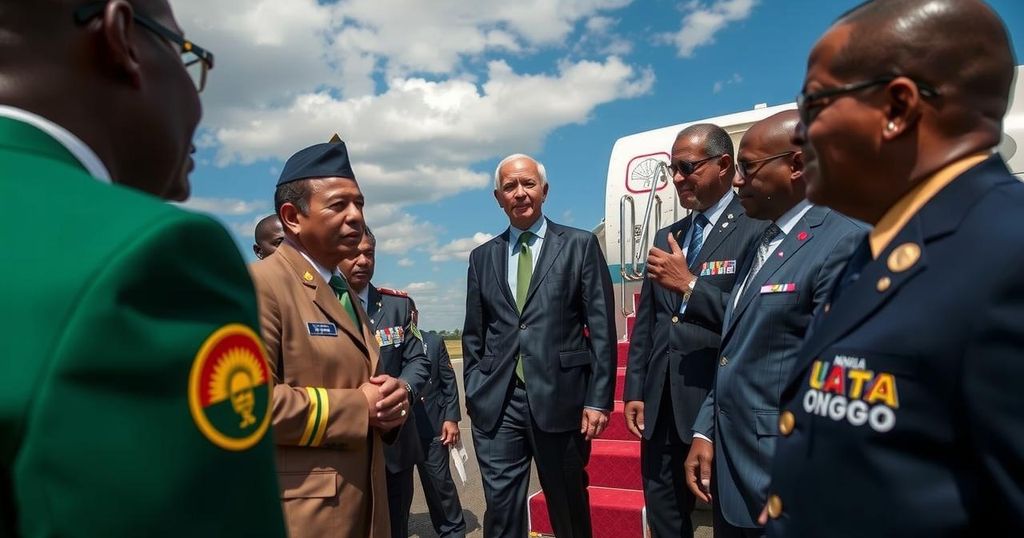President Joe Biden has arrived in Angola on his first sub-Saharan Africa visit, focusing on countering China’s influence via the Lobito Corridor railway project, which is essential for accessing critical minerals for technology and energy sectors. The trip includes engagements with various leaders and highlights the evolving U.S.-Angola relations amidst scrutiny from international rights groups regarding governance issues.
On Monday, President Joe Biden arrived in Luanda, Angola, marking his first presidential visit to sub-Saharan Africa. This three-day trip aims to overshadow China’s growing influence in the region by promoting a significant U.S.-backed railway initiative known as the Lobito Corridor, which spans Zambia, Congo, and Angola. The railway’s redevelopment is pivotal for accessing critical minerals essential for electric vehicle batteries and renewable energy technologies, a sector where the United States presents formidable competition to China.
Accompanied by widespread public enthusiasm, Biden’s visit follows a brief meeting in Cape Verde with Prime Minister Ulisses Correia e Silva. In Angola, he is scheduled to confer with President João Lourenço, visit the National Slavery Museum, and inspect the Lobito port project. Upon taking office, Biden committed to enhancing U.S.-Africa relations, a promise rooted in his revival of the U.S.-Africa Summit in December 2022 and the subsequent postponements due to natural disasters, raising concerns among African leaders about America’s prioritization of engagement with their continent.
This visit also occurs against the backdrop of an impending transition of power to President-elect Donald Trump, who is perceived as shifting the focus back to traditional American interests. While Biden’s administration highlights the Lobito Corridor as a strategic effort to counteract China’s dominance in critical minerals—a sector where China maintains a significant foothold—there are apprehensions regarding its longevity under the next administration.
The U.S. has allocated $3 billion to support the Lobito Corridor and similar projects, partnering with various financial entities. Observers express cautious optimism about the project’s potential longevity, contingent upon its framing as vital to U.S. interests in Africa and its capacity to counter Chinese influence. Diplomatic progress aided in securing U.S. interests in Angola after years of complicated relations, enhancing cooperation in health, agribusiness, and security during Biden’s visit.
Amidst these highlights, there exists tension regarding governance issues in Angola, with rights groups scrutinizing the country’s trajectory under President Lourenço. As Biden engages with Angola, he will navigate the balance between promoting U.S. interests and addressing human rights concerns, striving to solidify the U.S.-Angola relationship within a broader context of African diplomacy in the face of competing international influences.
President Joe Biden’s visit to sub-Saharan Africa, particularly Angola, represents a significant diplomatic effort aimed at enhancing U.S. standing on the continent amidst increasing Chinese influence. The Lobito Corridor railway strategic initiative symbolizes a direct effort to engage with Africa’s vast mineral resources, which are vital to emerging green technologies. Biden’s administration is keen on showcasing the U.S. commitment to Africa through infrastructure projects while acknowledging the complex political landscape marked by governance issues within Angolan society. This trip is particularly noteworthy due to the historical context of U.S.-Angola relations, which have evolved from conflict-laden interactions during Angola’s civil unrest to a collaborative partnership focusing on trade and security. The timing of Biden’s visit also coincides with an impending administration shift that raises questions about the future prioritization of such initiatives in U.S. foreign policy.
President Biden’s inaugural visit to Angola underscores a critical juncture for U.S.-African relations, particularly against the backdrop of escalating competition with China. The Lobito Corridor initiative aims to reinforce U.S. engagement through infrastructure investment in crucial mineral sectors. However, the success and sustainability of this diplomatic effort may hinge on the subsequent administration’s policies. Furthermore, Biden’s approach to human rights and governance challenges in Angola will test the U.S.’s commitment to value-based diplomacy on the continent.
Original Source: www.mercurynews.com







